Happy Tuesday! It appears that Bay Area techies are trying to find love by leaving notes in the seats of self-driving taxis. We sense the next Netflix rom-com in the making.
Quick Hits: Today’s Top Stories
- El Salvadoran President Nayib Bukele said Monday that he would not return Kilmar Abrego Garcia—an immigrant who was deported to an El Salvador prison due to an “administrative error” last month—to the United States. “How can I return him to the United States? Like if I smuggle him into the United States?” Bukele said during an Oval Office visit, claiming that he had “no power” to return Garcia, who is a Salvadoran national. The Supreme Court upheld a lower court ruling requiring the U.S. government to “facilitate” Abrego Garcia’s return last week, but the Trump administration has argued the decision over whether to expatriate the detainee lies with El Salvador.
- Cody Balmer, the Pennsylvania man facing charges connected to an arson attack at Pennsylvania Gov. Josh Shapiro’s residence, is being treated at a hospital for an unrelated medical event, according to police. While the motives for the attack remain unclear, court documents have shown that Balmer told police he planned on beating Shapiro with a hammer after breaking into the mansion. His mother told reporters Monday that Balmer had bipolar disorder and schizophrenia, but was not taking his medication. Politicians of both parties condemned the attack, with Republican Sen. Dave McCormick of Pennsylvania calling it an “assault on democracy.”
- Meta CEO Mark Zuckerberg testified Monday in an antitrust trial, the first held under President Donald Trump’s Federal Trade Commission, in which government lawyers accused Meta of establishing a monopoly over social media. By acquiring the social media platforms Whatsapp and Instagram while they were still start-ups, Meta established a monopoly over the market for social networking, FTC lawyers said. In defense of his company, Zuckerberg testified that the social media market was larger than the government’s definition of demand for services that connect friends and family. Zuckerberg also argued that Meta, which owns Facebook, faced competition from companies like TikTok.
- Harvard University said Monday that it would refuse to comply with a list of Trump administration demands that it make significant reforms to its governance and operations. An administration task force charged with investigating allegations of antisemitism across dozens of American universities made extensive demands of Harvard, including ending all diversity and inclusion programs, submitting to external audits of a range of departments, and refusing admission to international students “hostile to American values.” The Trump administration threatened to pull roughly $9 billion in federal grants and funding if these conditions were not met. Following Harvard’s statement on Monday, the White House announced plans to freeze more than $2 billion in multi-year grants to the Ivy League university.
- In a Sunday post on Truth Social, President Trump wrote that he had a “hope” that the Federal Communications Commission would block the merger of CBS parent Paramount Global with Skydance Media, after he was apparently angered by an episode of CBS’ 60 Minutes, which included reports on Ukraine and Greenland, that aired over the weekend. “Hopefully, the Federal Communications Commission (FCC), as headed by its Highly Respected Chairman, Brendan Carr, will impose the maximum fines and punishment,” wrote Trump, after recounting his unrelated and ongoing suit against CBS and 60 Minutes.
About Those ‘Manly’ Jobs

‘You Have to Imprison Some’
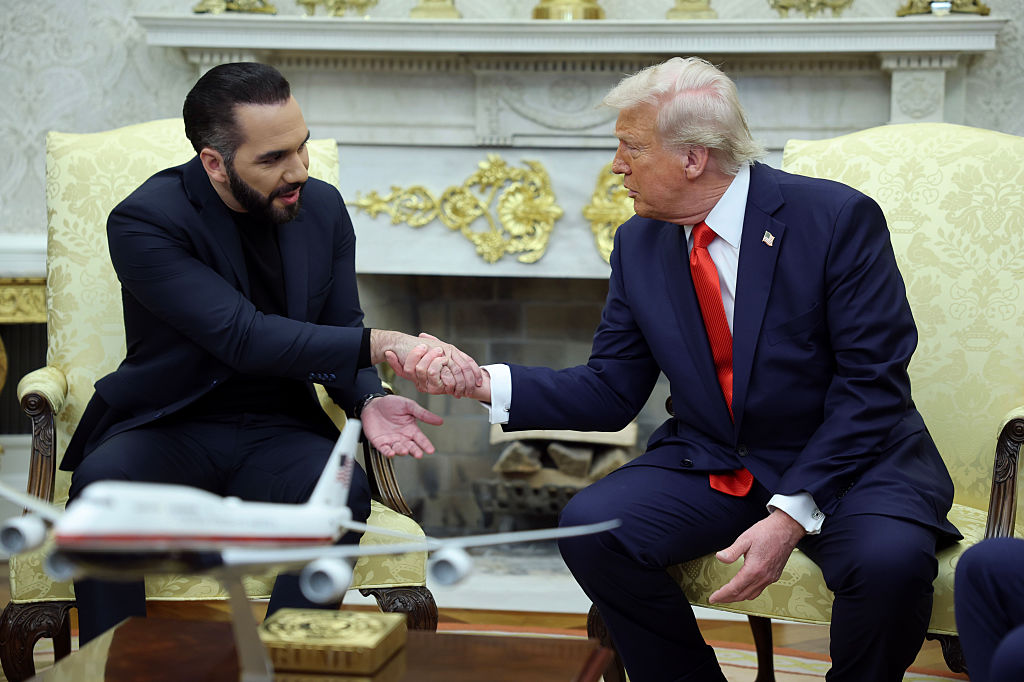
Speaking from the Oval Office on Monday, Nayib Bukele—El Salvador’s 43-year-old president and the architect of its mass incarceration scheme—offered words of advice to his American counterpart. “Sometimes they say that we imprisoned thousands. I like to say that we actually liberated millions,” he said of his country’s crackdown on gang violence. “Mr. President, you have 350 million people to liberate. But to liberate 350 million people, you have to imprison some.”
And Bukele appears more than willing to help Donald Trump in the process. The Salvadoran president, the first Latin American leader to receive an invitation to the Oval Office during Trump’s second term, found himself at the center of America’s immigration debate after opening his sprawling prison system to deportees from the United States. But Bukele is an ally of both opportunity and ideology. Since taking office in 2019, the young president has attracted the praise of Trump’s inner orbit for successfully ridding his country of rampant gang violence.
But critics warn that the crackdown came at a high cost: Bukele has marginalized his political opponents, undermined due process, and flouted court orders. Now, some fear he may be helping the Trump administration ...
As a non-paying reader, you are receiving a truncated version of The Morning Dispatch. You can read our 1,155-word item on El Salvadoran President Nayib Bukele’s White House visit in the members-only version of TMD.
Today’s Must-Read
Given the diffuse nature of Radio Free Europe/Radio Liberty’s work, the magnitude of its contribution to the collapse of the Soviet Union and the spread of freedom across Central and Eastern Europe is difficult to quantify. An approximation, however, might be deduced from the hostile actions undertaken by the regimes whose legitimacy the radios undermined. From RFE/RL’s very beginning, Eastern Bloc intelligence agencies were constantly trying to infiltrate it with spies, so that they could pilfer information and sow discord among the staff. Communist regimes went to great lengths jamming its broadcasts and doled out harsh prison sentences to those caught listening to the radios’ forbidden programming. In the 1950s, two Radio Liberty employees were murdered in West Germany, probably by Soviet agents, and the Czechoslovak intelligence service once tried to poison the salt shakers in the RFE/RL cafeteria.
Toeing the Company Line
Is Don Bacon a ‘Rebel Republican’?
The Nebraska congressman from a purple district has made a habit of pushing back against Trump.
It’s Time to Pay Kidney Donors
We need more kidney donations. I would know.
Will 2026 Be a 2020 Redux?
Two recent executive orders have at least one former election official worried.
Assessing Claims Made in Alex Jones’ Interview With Tucker Carlson
Both Jones and Carlson pushed incorrect claims onto viewers.
Worth Your Time
- Writing for Pirate Wires, Trae Stephens argued that the Trump administration’s aim of reshoring manufacturing and defense production elides a critical factor: automation. “But tariffs aren’t enough. A concrete equipment construction factory in, say, Youngstown, might see a short-term spike in demand thanks to artificially reduced foreign competition. But that factory’s long-term economic competitiveness depends on production-side improvements: it has to turn out products faster and cheaper. And the only way to do that is by leaning hard into automation,” he wrote. “Patriotism demands we go all-in on robots and AI in manufacturing. More than any treaty or tariff, automation is what will keep us ahead of the world’s foremost authoritarian menace. Fighting automation isn’t just bad economics — it’s a surefire way to ensure America loses the battle for the 21st Century.”
- M. Anthony Mills and TMD alum Price St. Clair examined the changing politics of science in Issues in Science and Technology. “The idea that distrust in science is due simply to ignorance—or a ‘deficit’ of information—has been especially alluring to many members of scientific, educational, and media institutions because it presupposes that what needs fixing lies not with those institutions but rather with ignorant others. Although this framing has long been discredited by scholars, it persists in part because these same institutions are uniquely well-positioned to supply more information. Yet distrust is a relational concept—it calls for repair, not more information. Efforts to fill the void left by distrust with more information are therefore unlikely to succeed; they also run the risk of aggravating the underlying cause of distrust,” they wrote. “From this point of view, what is remarkable is not that some of us distrust abstract systems more than others, but rather that most of us do trust them most of the time. The question is, why? How do modern societies maintain social trust given the centrality of abstract systems, which demand faceless commitments?”
Presented Without Comment
The Financial Times: EU Issues U.S.-Bound Staff With Burner Phones Over Spying Fears
In the Zeitgeist
If you like the sound of a sonorous Midwestern man singing over electronic music, you’ve probably had a good week. Bon Iver’s new album SABLE, fABLE dropped last week, and he put out the official music video for “There’s a Rhythm/ Au Revoir” over the weekend. Happy napping!


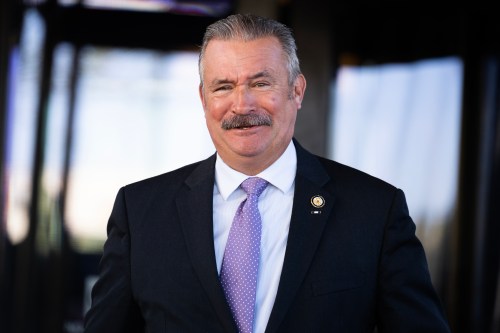
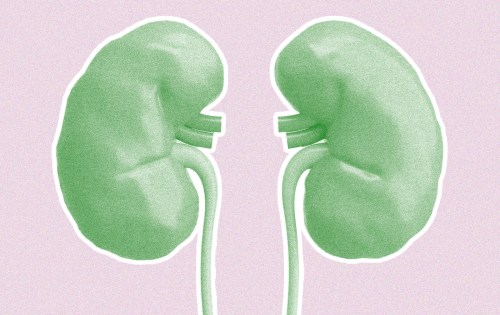
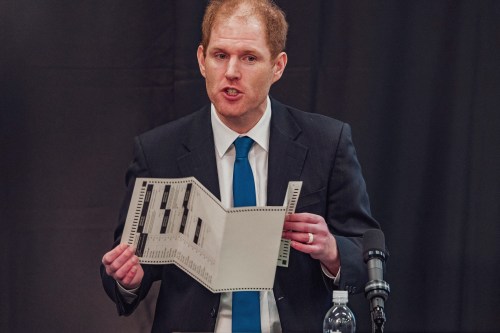




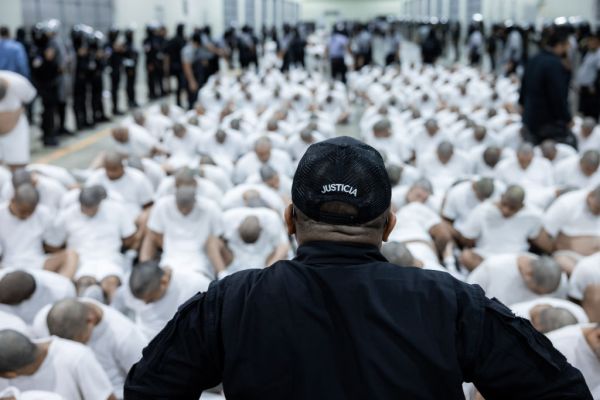



Please note that we at The Dispatch hold ourselves, our work, and our commenters to a higher standard than other places on the internet. We welcome comments that foster genuine debate or discussion—including comments critical of us or our work—but responses that include ad hominem attacks on fellow Dispatch members or are intended to stoke fear and anger may be moderated.
With your membership, you only have the ability to comment on The Morning Dispatch articles. Consider upgrading to join the conversation everywhere.